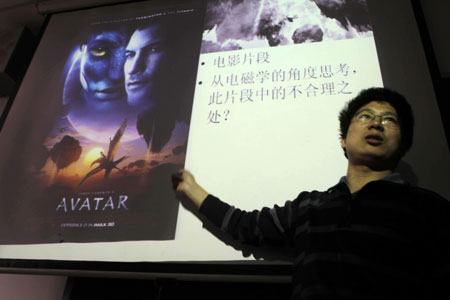People
Nod to new avatar of physics teachers
Updated: 2011-03-03 07:53
By Guo Shuhan (China Daily)
|
 Mi Qi teaches a science fiction physics class for students at the high school affiliated to Renmin University, Beijing. Wang Jing / China Daily |
High School student Zong Yiming has discovered a passion for physics in his everyday life.
While doing push-ups, his mind dwells on the principles of mechanics as he notices that by placing his arms at different points under his body, he can vary the amount of force he applies.
Zong's keen observations of the physical world have been triggered by the Science Fiction Physics course he opted for at the High School affiliated to Renmin University.
Unlike traditional physics classes that focus on theory, this experimental course hopes to inspire original thinking.
The 10-week course's learning materials are not textbooks but sci-fi films such as Avatar, The Day After Tomorrow, 2012, Superman and Spider-Man.
Students are encouraged to discover the science behind the thrilling scenes in these films and also discuss the script's scientific accuracy.
A short essay is required at the end of the course. Students can either describe or correct the physical context of any film of their choice, or design a brief sci-fi script based on their newly acquired knowledge.
"The course aims to convey the idea that science is all around us," says Mi Qi, the course's chief designer.
Student Zhou Zhiya believes it "offers another way to approach science".
Previously, Zhou says, she found sci-fi films too alarming but now "feels relieved knowing the possibility of such a large-scale catastrophe is remote".
Mi says he was inspired to start the course after thumbing through the book The Physics of Superheroes, while attending a meeting in the United States. Citing examples from comic books featuring superheroes, the book explained many principles of physics in a fun and accessible manner.
Mi then approached two other physics teachers - Wang Qi and Li Zhigang - to offer the experimental course for three semesters.
While students are not given any extra homework, teachers have to put in a lot of time and work to prepare for every class.
But what makes it worthwhile is to see the packed classroom with some 40 students each semester, a comparatively high turnout for an optional course, and changes in students like Zong.
Wu Yan, an associate professor of sci-fi literature, at Beijing Normal University, believes such teaching models should be popularized and applied to other disciplines.
He recommends conducting a survey to find out if the class is indeed enhancing students' imagination and observation, and their ability to innovate and apply what they learn.
The school's vice-principal Wang Qi says: "Intuition and insight matter more than rigorous analysis.
"We hope our students can eventually come up with innovative perspectives on a wider range of scientific and human problems."
Specials

'Super moon'
The "Super Moon" arrives at its closest point to the Earth in 2011.

Radiation test
The probability of being exposed to a life-threatening level of radiation is quite slim.

Panic buying of salt
Worried Chinese shoppers stripped stores of salt on radiation fears.